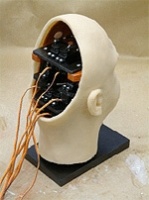Animatronic head provides test-bed for smart materials
Design engineers are exploring an innovative new application for smart materials as potential implants for stroke patients suffering facial paralysis.

A common consequence of stroke is that the facial nerve is damaged — effectively paralysing the associated muscles and causing problems with expression, speech and drooling.
Looking for new treatment ideas, neurosurgeon Prof Michael Vloeberghs of Nottingham University approached a team of product designers and engineers at Nottingham Trent University, led by Dr Philip Breedon.

The team has now built an animatronic head with silicon-like skin to test aspects of the basic design, but Breedon cautions that any clinical trials in humans could be 10 years away.
‘Obviously, there would have to be some form of training — we’ve been exploring a camera system that would look at the face and map the mouth and create lots of data points around the extremities of the lips, so as you move your mouth the camera tracks that. So if you’ve had this device implanted then basically this movement would be mapped and would train the new device,’ Breedon said.
Register now to continue reading
Thanks for visiting The Engineer. You’ve now reached your monthly limit of news stories. Register for free to unlock unlimited access to all of our news coverage, as well as premium content including opinion, in-depth features and special reports.
Benefits of registering
-
In-depth insights and coverage of key emerging trends
-
Unrestricted access to special reports throughout the year
-
Daily technology news delivered straight to your inbox










Water Sector Talent Exodus Could Cripple The Sector
Well let´s do a little experiment. My last (10.4.25) half-yearly water/waste water bill from Severn Trent was £98.29. How much does not-for-profit Dŵr...